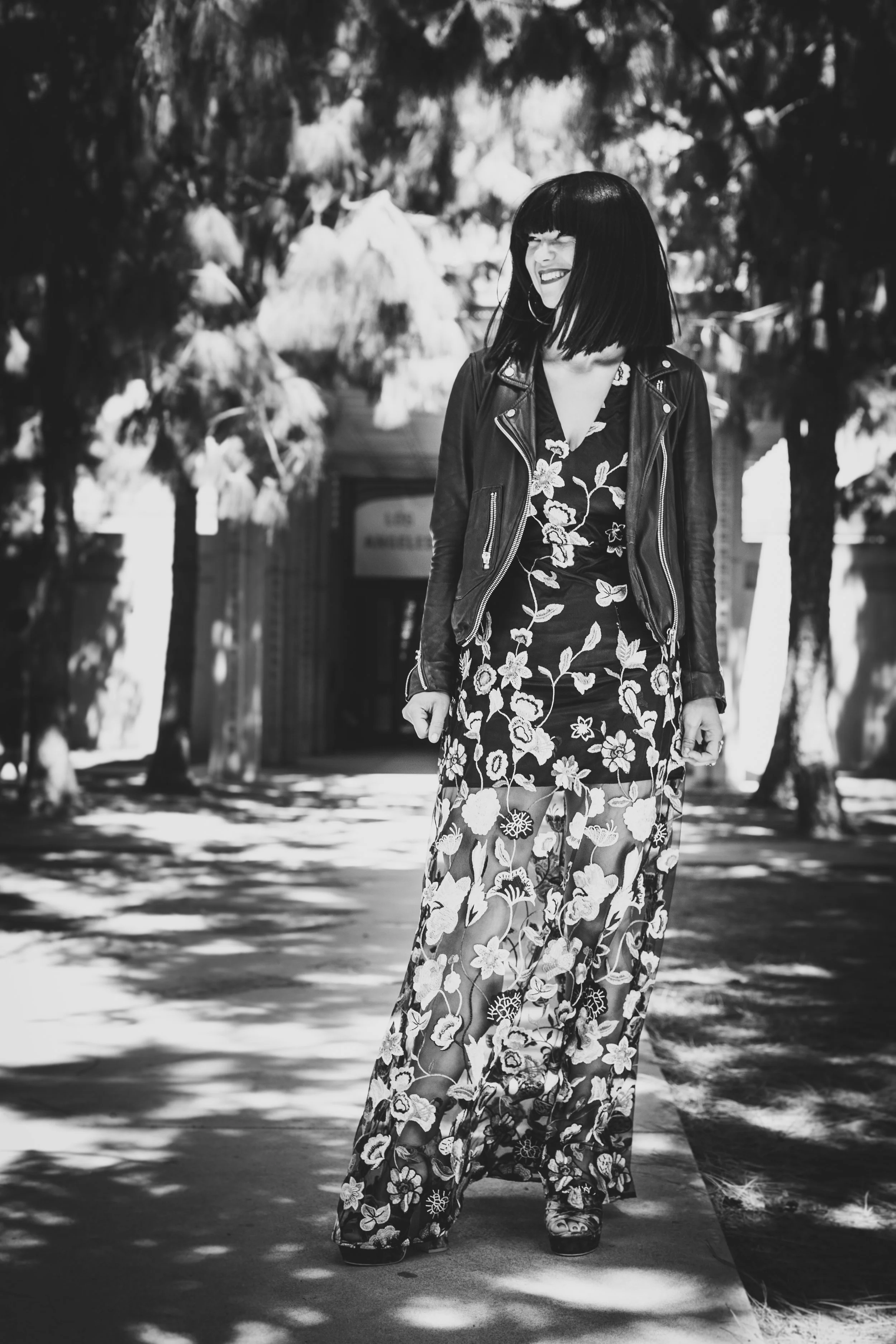Laura Lee (Khruangbin): Interview 48
Laura Lee is best known as the bassist of Khruangbin, a three-piece acid-funk-step-surf-chill-core-hop-sad-wave band formed in Houston, Texas. (I stole that description from the band's AMA thread on Reddit because their music is so unique and genre-defying that I couldn't come up with something fitting myself.)
Laura and I met up in L.A. and chatted about going with your gut, the profound effect of her favorite book, creating a world in romantic relationships, and of course, we rocked Five Questions. (I also snapped a few photographs of Khruangbin in Boston that you can see here.)
Meet Laura.
How do you define failure?
The only time that I would consider failure, is going against myself. There are times when—I’m of two minds. My head mind and my body mind. My brain is such a sharp tool and I can convince myself of anything. But usually my gut knows what’s right and what’s not.
The only time I would consider myself failing is when I don’t listen to my gut when I’m doing something I know in the back of my mind probably isn’t the right thing. Otherwise, I think you can’t fail. If you throw yourself into it, and it’s what you think is right, then there’s no wrong. In fact, the harder you fail the more badass it is.
STEVE: Have you had a moment where you stuck to the wrong move?
LAURA: As soon as I know—I have pretty good integrity about knowing. Like, “Shit. I need to not be here” or whatever. I can see myself about to go for it sometimes and I usually have some sort of body alert that says, “Must change.” People comment on the fact that I feel like I’ve lived a lot of lives. It probably comes from a result of that process.
What's one piece of art, music, film, etc that has profoundly affected your life?
I’ve been revisiting a book. One Hundred Years of Solitude. I read it as high school reading—I went to a Montessori school, so we got a choice and that was my choice. I read it four times that year. My original copy is covered in highlighter and notes. It reminds me of my grandad who is a source of inspiration for a lot of my life.
The book is magical realism. But when you ask Gabriel Garcia Márquez, the author, about it he says, “These are stories my family told me and they would say that they’re real.” And my grandad was like that. He would tell me stories, and in Spanish, my grandmother would tell him to shut up and not fill my head with these crazy notions. But it’s about keeping an open mind and seeing life bigger than it is on the surface.
The book is beautiful. It’s about beauty and the various things that happen in life, through generations, and over cyclical periods of time, and there’s ugliness and beauty in everything. And seeing that people could live for 200 years and it not being a weird thing. Because they can in your head. That is a really big piece for me.
What's one thing you don't know now, but feel compelled to know before you die?
Easy question! [Laughter]
I think I’d like to know how far I can push myself.
STEVE: In what direction?
LAURA: Work. I guess. My goal is to leave behind a legacy of some kind. That was always my—as a kid I had the World Books—I would really like to be in one. I used to paint in high school, so I thought it would be for that.
So I don’t know if there’s anything I have to know. I think I’m always searching. You should only know what you should know. Whatever you shouldn’t is probably not meant for you to know. [Laughter]
How do you define being “in love”?
I’ve been thinking a lot about love lately. Love for me, in terms of a romantic love, is two people coming from two different worlds and coming together and making a new world that is fit for the both of them. It usually comes with a struggle, but obviously, the romanticism and the beauty that comes from the struggle and from the infatuation you have with each other is this thing. It feels like if you were alone in this world the whole time, all of a sudden it’s like this energy has been with you the whole time, and it makes you feel like any moment that you felt alone, you weren’t, and now you know you have this thing.
“It feels like if you were alone in this world the whole time, all of a sudden it’s like this energy has been with you the whole time, and it makes you feel like any moment that you felt alone, you weren’t, and now you know you have this thing.”
I’ve been really struggling in writing about love and trying to figure out how to represent it. And I think that’s what it is. You see it in movies and books and everything, and you see two people coming together and they take a part of each other and start to adapt in their own lives until they’ve created a bubble that works for the two of them.
STEVE: Creating their own world.
LAURA: Yes.
STEVE: I’ve asked a lot of people this question and I haven’t heard it framed that way. I really love that idea though. You’re almost creating a separate place for the two of you to find your own footing.
LAURA: I think that has to be how it is if you say “in love.” Because we’re ever-evolving. I can definitely look back on my life and see that I’ve changed a lot. Quite regularly. In order to stay in love, that world you’ve created has to be able to move with both of you. I think that’s what it is.
STEVE: That’s an awesome idea. I appreciate that you acknowledge that we change every second, we’re always changing. A lot of people think, “No, no, you can’t change anymore!” And those folks get left in the dust. But that idea of change—it’s a huge part of Zen Guitar, a book I adore—is the way [author Philip Toshio Sudo] talks about contradiction and change.
We’re always changing, nothing’s permanent, yet we’re trying to focus on one goal, if you will. Which is such a strange experience. But the idea of 1) Knowing you’re going to change, and 2) Creating a place that will ultimately, kind of stay the same, it’s like a safe space, obviously in your core beliefs, but it’s a space that you can still change within.
LAURA: Totally.
STEVE: Seems impossible sometimes, doesn’t it?
LAURA: It does.
Change is just inevitable. I think that thing I was talking about at the beginning, the body thing. If you never change, you’re fighting something. I just don’t know how you couldn’t change.
STEVE: You play a lot and tour a lot. There are physical stressors in that. How does stress manifest in you?
LAURA: Oh yeah, stress definitely manifests. I take on too much sometimes. Stress physically happens. I physically get sick. Usually it’s a cold or bronchitis or I’m physically run down. And it’s because the universe said, “You have to stay in bed! You have no choice!” So then I usually have to deal with my stress.
STEVE: What do you do?
LAURA: Writing. Walking. When I lived in London it was built in. With my headphones on. I don’t have that luxury [in L.A.] so I have to make it. Thomas Jefferson wrote about it in a letter to his nephew and one of the things he said something like every morning take a walk for an hour and don’t do anything except walk. And that really works for me. I just need the space for reflection and if I don’t take it, I’ll get a cold. [Laughter]
STEVE: For sure. My dad calls them his daily constitutionals. I love walking. I try to get out every day to walk. It’s amazing, the creativity that kicks in when I’m walking.
LAURA: Totally.
STEVE: I’ll listen to tunes a lot, but I’ll stop and take notes of my thoughts. That self-reflection is so important for me.
LAURA: Yeah, I think that’s probably the best thing. Obviously having some sort of physical exercise is really good, but I think when I’m walking on my own, it feels like time just for me in a way that I just enjoy seeing the houses or the trees.
STEVE: Absolutely. Taking inspiration from the world.
What will you miss the most when you’re gone?
It’s hard to know because I don’t know what the next one will have. But I think probably just laughing with my friends.
STEVE: Do you have an idea of what might happen after you die?
LAURA: No. I don’t. I’m fucking excited to see! If this one is a speck of what is to come, I think it’s going to be awesome.
The best moments are when you’re bent over laughing about something stupid. If the next world is more meta than that, then I will miss those simple things.

